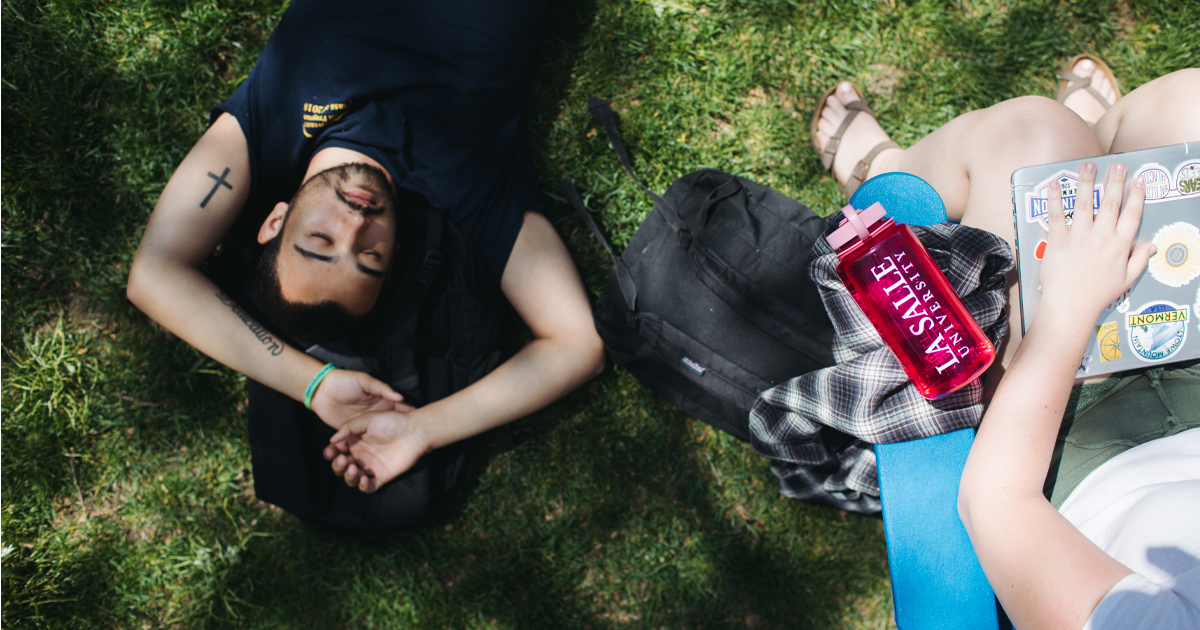La Salle University
Using rest as a tool to fight racism
Rest as Resistance is the focus of La Salle’s Feb. 9 academic enrichment day.
Combatting racism through rest may seem paradoxical, particularly after the events of 2020 made clear a need to strengthen the principles of anti-racism in America.
However, allowing time for the mind and body to power down while working toward social justice is not a contradictory concept. That is the underlying message of an academic enrichment day at La Salle University, scheduled for Tuesday, Feb. 9.
Rest as Resistance is the theme of this academic enrichment day—the first of three built into the academic calendar this semester. Academic enrichment days aspire to give members of the La Salle community a Zoom-free respite from those days’ classes, coursework, and schedules while offering opportunities to explore important topics like anti-racism and showcase academic projects.
The concept of Rest as Resistance centers around a belief held by noted scholars and authors who, like Resmaa Menakem, contend that since racism is a trauma on our bodies, any effort to heal racism begins with healing our bodies. Rest can then be a form of inoculation against the virus of racism, since resting allows us to heal and our healing can have a ripple effect in our communities.
The University’s Joint Commission on Diversity, Equity, and Inclusion, the Faculty Senate’s Anti-Racism Working Group (ARWG) and educators in the La Salle University Art Museum have curated the resources for the Rest as Resistance Academic Enrichment Day, which highlight what social justice leaders, particularly women of color, are teaching us about the importance of rest for disrupting oppressive and unhealthy aspects of our dominant culture, the personal and collective benefits of active rest, and best practices for resting.
“Those of us involved in this enrichment day heard from members of our University community about the need for rest, especially since we’re still grappling with a global pandemic amid an extended semester,” said Maureen O’Connell, Ph.D., associate professor of religion and theology and a member of the ARWG. “We decided to use this day to call our University community’s attention to peoples of color, especially Black women, currently advocating for rest as a form of resistance. These luminaries remind us that we as a nation have long relied on the unpaid labor of Black and Brown people, particularly women, to make our economies and institutions work. For them, rest isn’t a luxury. It’s about survival.”
Here are ways you can participate in the Rest as Resistance movement, either during La Salle’s academic enrichment day or in the days that follow:
Take a personal rest assessment
Physician, author, and speaker Dr. Saundra Dalton-Smith has developed this quiz to determine which forms of rest may best suit you.
Read ‘The Elemental Guide to Napping’
This three-part series from Medium’s science-focused site Elemental explores the science behind napping, the keys to a perfect nap, and the napping-as-resistance movement.
Take a “nap” in the La Salle University Art Museum
The Art Museum invites members of the La Salle community to take a “nap,” so to speak, in its gallery between 12 – 3 p.m. in front of the print Winter Sleep by Paul Klee. Masks are required and social distancing guidelines will be in place.
Explore resources from the Nap Ministry
The Nap Ministry, founded by Rev. Tricia Hersey, has made available a variety of resources related to the Rest as Resistance movement. These range from guided meditations, to a Spotify playlist, to interviews with Rev. Hersey on NPR and the Story Collider podcast—the latter of which examine the relationship between rest and social justice. For more, you can follow the Nap Ministry on Instagram.
Rest Then Rise meditation
Practice this guided meditation from Lotus LaLoba, designed to be a form of what LaLoba calls “rest activism.”
Post on social media
Share your resources for resting or images from your moments of rest by using the hashtag #LaSalleRestsforChange on social media.
—Patrick Berkery
